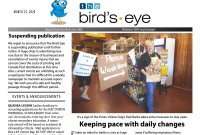Support strong Canadian climate journalism for 2025
Melanie Fournier went to bed a week ago Thursday feeling grateful that, despite everything going on in the world, she was in the best health of her life.
Less than 12 hours later, the 42-year-old Montreal-area woman was racked with coughs that left her gasping for breath and was burning up with fever.
"I woke up with a little scratch in my throat and started trying to cough it up," she said in a phone interview.
"Within 20 minutes I had a full-blown fever, I was hacking up my lungs and it hit me: I need help."
Fournier, who works in health and social services, is one of the thousands of Canadians who have been diagnosed with COVID-19.
She and several other Canadians have shared their stories with The Canadian Press in order to demystify the illness and to urge the public to respect physical distancing measures.
In the days following the onset of her symptoms, Fournier felt panic creeping in as she struggled to get through to anyone on Montreal's hotlines, which constantly disconnected her. Later, she had to fight to get tested since she hadn't travelled recently and didn't know who infected her.
Since her test came back positive last Monday, Fournier has struggled with burning lung pain, a cough and fever, and "body aches and pains worse than any flu I've ever had."
But even worse, she said, was the fear and isolation she felt after being left to fight a serious illness at home, with little advice beyond take Tylenol, rest and drink fluids and call 911 if she couldn't breathe.
"It's scary going through this by myself," she said.
Kyla Lee, a 33-year-old lawyer from Vancouver, takes issue with those who claim COVID-19 is no more than a bad flu.
Lee, who has no underlying health conditions, says she fell ill a few days after returning from a conference in Ohio and was diagnosed as a presumptive case by a doctor after she began experiencing a fever, fatigue and a deep cough.
The busy lawyer, who rarely pauses in her day and has never taken more than a day or two off for any illness, said that even nearly a week later, on her bad days she's left gasping for breath on the edge of her bed after just a couple of phone calls.
"The breathing is the big difference," she said in a phone interview last week.
"It's like my lungs have sacks of rice around them, so when I take a deep breath I feel pressure."
Both Lee and Fournier decided to go public with their symptoms to show that even healthy young people with no underlying conditions are not immune and to help others who are worried about themselves or loved ones.
"It's an incredibly alienating virus," Fournier said.
"There's shame associated with it," she added. "How many people did I infect? Did I infect somebody? Will I cause somebody to die?"
At 61 years old, both Julien Bergeron and Manon Trudel are in an age demographic that is more prone to complications than either Lee or Fournier.
But the Montreal-area couple, who contracted COVID-19 aboard the Diamond Princess cruise ship in February, say the mental aspect of the journey was far worse than the physical.
The couple had to endure weeks of confinement in their windowless room on the ship docked in Yokohama, with instructions constantly blaring on the loudspeaker and and endless stream of personnel knocking at the door. Trudel, who has a background in workplace health and safety, knew the proper quarantine procedures weren't being followed, which added to the stress.
She began asking for protective gear and lobbying Canadian officials and eventually the media, doing interviews from inside their room's tiny bathroom to avoid the sounds of the couple fighting next door from filtering through the ship's thin walls.
Bergeron was told he'd tested positive on Feb. 18, Trudel a few days later. She had no symptoms, while he experienced lung pain and fatigue due to pneumonia but said it was no worse than his previous bouts.
The 22 days Bergeron spent in hospital were the longest the couple has spent apart in 25 years.
"It was very, very hard mentally," Bergeron said.
Now that they're home, the couple say they're worried that Quebec doesn't seem to be taking the virus as seriously as Japan, where they say those who tested postive were immediately put in hospitals or other facilities away from the public.
"Here, people are not hospitalized, not taken out of their living environment and it worries us enormously," Trudel said.
"People should be in hospitals or hotels, not with their families and friends, not going to the liquor store."
They say they're still taking the risk seriously and are staying away from others as they return to life in Quebec.
This report by The Canadian Press was first published March 29, 2020





Comments